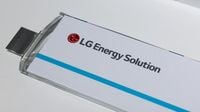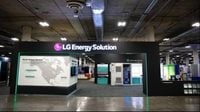JAKARTA – The recent withdrawal of South Korean company LG Energy Solution Ltd (LGES) from Indonesia's Titan Project, aimed at developing an electric vehicle (EV) battery supply chain, has raised questions regarding its implications for the country's investment landscape. On Tuesday, April 22, 2025, Eddy Soeparno, the Deputy Chairman of the People’s Consultative Assembly (MPR) of Indonesia, addressed these concerns, stating that the decision is not connected to the ratification of the contentious TNI Bill.
"I don’t see any relevance to the TNI Bill in this matter," Eddy remarked during a press conference in Jakarta. He emphasized that the decision by LG to withdraw from the project, which is valued at approximately 11 trillion won (around Rp130.7 trillion), is more closely tied to economic and commercial factors than political ones. Eddy’s comments came in response to speculation that LG’s exit was influenced by political unrest in South Korea, which has seen military-related tensions in recent times.
Despite acknowledging that some observers might link LG's departure to the TNI Bill, which has drawn scrutiny and debate, Eddy firmly stated, "I have yet to see a strong correlation between these two issues, as investment decisions are made based on various factors, primarily economic and commercial considerations." This sentiment reflects a broader understanding that investment decisions in the rapidly evolving technology sector often hinge on market dynamics rather than legislative changes.
Industry experts suggest that the rapid technological advancements in battery development could be a significant reason behind LG's decision. The shift from nickel-based batteries to alternatives like lithium iron phosphate (LFP) and blade batteries, which offer improved durability and faster recharging capabilities, is reshaping the landscape of battery technology. "Today, we are talking about nickel batteries, but now there are LFP batteries, and even blade batteries that are shock-resistant and heat-resistant," Eddy explained, highlighting the ongoing evolution in battery technology.
Furthermore, Eddy pointed out that Indonesia remains a promising market for battery consumption and a potential hub for battery exports. "I believe we have the capability to adopt battery technology, produce it ourselves, or collaborate with other partners. The goal is not just for domestic consumption but also for export," he stated, underscoring Indonesia's strategic position in the global battery supply chain.
Prior to LG's withdrawal, the consortium, which includes LG Energy Solution, LG Chem, and LX International Corp, had been working closely with the Indonesian government and state-owned enterprises to establish an integrated battery industry. This initiative was designed to secure a comprehensive supply chain for EV batteries, from raw material procurement to the production of battery cells.
With Indonesia being the world’s largest producer of nickel, a key ingredient in battery production, the country has been positioning itself as a vital player in the EV market. The government's push for electric vehicles, coupled with its vast natural resources, makes it an attractive destination for investment in battery technology and production.
Despite the setback with LG, Eddy remains optimistic about Indonesia's potential to attract future investments in the electric vehicle ecosystem. "We have the ability to create a robust battery technology sector that can serve both our domestic needs and international markets," he concluded, reflecting a hopeful outlook for Indonesia's role in the global transition to electric mobility.
The cancellation of LG's investment highlights the complexities of international business decisions, where technological shifts and market conditions often play a more significant role than political factors. As the EV market continues to evolve, Indonesia's ability to adapt and innovate in battery production will be crucial for its economic future.






